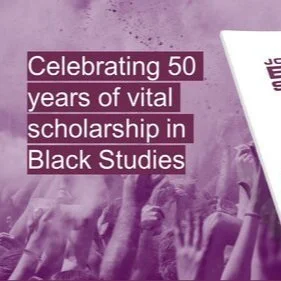In July 2021, the SAGE Journals team released a Diversity, Equity, and Inclusion (DEI) pledge shaped in complement to SAGE’s signing on to the Royal Society of Chemistry’s joint commitment for action on inclusion and diversity in publishing. With almost a year of work behind them, they reflect on 2021 highlights and offer 2022-2023 ambitions.
Read MoreThe idea of the Journal of Black Studies (JBS) was born in 1968 when a young academic named Molefi Kete Asante approached SAGE founder Sara Miller McCune with an idea for a journal that would respond to the Black studies movement as well as a public call for equality, justice, and nonviolence. At the time there was no comparable journal, and Sara saw this journal as a vital addition to social science scholarship. The first full volume was completed in 1971.
Read MoreThe theme of Peer Review Week 2021 is Identity in Peer Review, a timely topic that raises some interesting questions. Does anonymity provide a fairer peer review process? How does the identity of peer reviewers shape publications? And how can we make sure that the peer review process is welcoming and inclusive to all?
Read MoreEarlier this year SAGE announced a partnership with Clarivate to offer transparent peer review on four of our journals. This year’s Peer Review Week, dedicated to the theme “Identity in Peer Review”, is the perfect time to reflect on the results we’ve seen so far.
Read MoreRecently, SAGE garnered accolades for three of these resources at the thirty-third annual APEX awards, winning a Grand Award for Together Apart: The Psychology of COVID-19, an Award of Excellence for the How to Get Published webinar, and an Award of Excellence for the Structural Racism and Police Violence microsite.
Read MoreSAGE Publishing has released the five-year Journal Impact Factors (JIF) for the third year running, as part of a wider initiative to broaden the scope of alternative measures of research impact.
Read MoreWhat are journal editors, funders, and publishers doing to support researchers of all backgrounds – specifically those who have been underrepresented, unheard, and underprivileged? What impact does this effort have on the research environment and even for the research itself? And what can we learn from each other to enable new changes that address shortcomings?
Read MoreApart from our research project on a good day, the other thing that can potentially offer PhD students a sense of fulfilment is teaching. Teaching and learning, much like many other facets of our lives, have been deeply impacted by the ebbs and flows of this pandemic. As a doctoral researcher who has taught both before and during the pandemic, I've learnt a few things through experience as well as through the support of the teaching community at Sussex that has been a great resource for helpful tips.
Read MoreStarting a PhD, at the best of times, is an overwhelming combination of literature reviews, training sessions, orienting oneself to the start of a long academic commitment and, if we're lucky, the excitement of finally pursuing a passion project. But starting a PhD in a pandemic offers a whole set of emotional, technological and logistical upheavals.
Read MorePreprints can represent a number of points on the timeline of scholarly communications, be it posted before submission to a journal or archived after a paper is already published, or even as an end goal itself. In the simpler times before COVID-19, an author may have decided to post a paper to a preprint server in order to get credit for research or get comments from other researchers before ultimately submitting to a journal. They then would have submitted their research to a journal and waited several months for their paper to go through peer review.
Read MorePeer reviewers elevate the quality of the work they review with the feedback they provide. They challenge their peers to higher standards of research and scholarly communication. Most importantly, their feedback protects the integrity of the academic record. They are essential contributors to the academic publishing process.
Read MoreAfter months or years of research and writing the last thing you want is an unnecessary delay with the peer review of your paper. Sometimes turnaround times are beyond your control, however, there are some simple things you can do to ensure that your paper gets through peer review as quickly and painlessly as possible.
Read MoreTransparent peer review, where the exchanges between peer reviewers and authors accompany published articles, continues to be both lauded and critiqued by the scholarly community. Together with managing editor of Therapeutic Advances in Respiratory Disease (TAR), Phillip Shaw, I discuss the possibilities and limitations brought by a switch to transparent peer review, how increased transparency may help us in improving the author experience and help abate increasing issues of trust in scholarly results.
Read MoreAt SAGE, high quality peer review is a cornerstone of our approach to journal publishing, which is why we’re once again supporting Peer Review Week, taking place September 21 – 25.
Read MoreIn the final part of this series, Devyn talks to Aanchal and Louise about synchrony in Autism Spectrum Conditions, a new side project, and disruptions to school research.
Read MoreIn this conversation with the Sussex Hive Scholars, Devyn and Louise ask Aanchal about her work on comics and nostalgia and her experience of being an international student at Sussex.
Read MoreSo there I was... on the 9th of June, 2020, wearing work attire for the first time in three months, sitting in front of a green screen, in a video conference with 40+ people on three continents. This culminating experience went from something I was dreading to a day that could not have been more special, and it would not have happened without a pandemic.
Read MoreHow are international students affected by COVID-19? Were there any surprises when conducting interviews online? What does it feel like to be part of the group you are studying? These are just some of the topics that came up when the Hive Scholars sat down to discuss the research being done by one of our own!
Read MoreGlobal failures to protect the public from the corona virus first wave are visible for all to see. Global failures to protect the health and safety of doctors, nurses and other health professionals dealing with COVID-19 patients have been highly visible too on our TV screens and in newspapers.
Read More


















